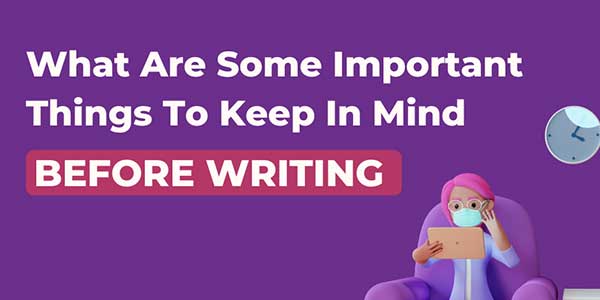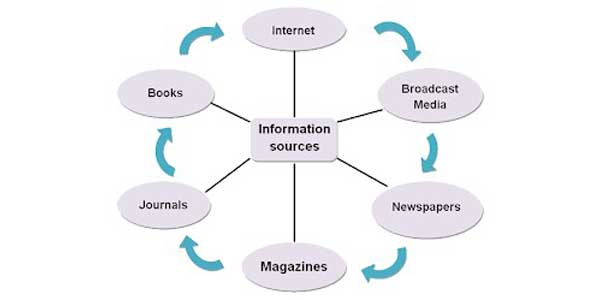
You are going to be writing. You are going to be thinking. In addition, when you register, you want to make sure that your writing keeps your readers engaged and interested in what they are reading. However, how do you do this? What are some important things to keep in mind before writing? In this article, you will be checking out some of the most important things you should not ignore while writing.
Table of Contents
1.) Consider Your Readers First:
It would be best to consider who your audience is and what they are looking for. For example, write in a conversational tone if you are writing for a general audience.
On the other hand, if you are writing for experts, be more formal.
Likewise, if it is for a company newsletter or an internal memo, then the language in your piece needs to reflect the brand’s tone.
If it is for a blog post, it should be more informal, professional, and informative.
That is why the most important thing to keep in mind when writing is that you should be thinking about your readers.
This will help you write in a way that is easy to understand, and it will help you make sure the message you want to convey is getting across.
Another vital thing to consider when writing is what kind of audience you are trying to reach.
If you want something simple, try to simplify the message as much as possible and focus on making things easy for them to understand.
On the other hand, if you want something more detailed, it makes sense to go into more detail and make things clearer for your readers.
2.) Keep Things Easy To Understand:
If you want your readers to understand what you are saying, make sure that it is easy for them to understand the message.
Use simple language and avoid complex sentences and jargon. You can do this by using short sentences and short paragraphs within longer paragraphs.
For example, instead of saying, “The dog is barking,” say, “The dog is barking loudly.” This gives the reader more information without making them read long sentences or paragraphs, which may not be necessary.
Make sure that everything makes sense when read aloud or written down – if it does not, re-read it until you do.
Another important thing to remember before writing is what information people need from their reading experience.
Think about whether or not there will be any jargon, acronyms, or unfamiliar terms used in your article, and if so, how can you explain those terms clearly so that readers understand them?
If you want something simple, try to simplify the message as much as possible and focus on making things easy for them to comprehend.
On the other hand, if you want something more detailed, it makes sense to go into more detail and make things clearer for your readers.
3.) Take Help From Essay Writing Services:
You have to be mindful of all the important things that can help make your writing compelling and interesting to read.
However, sometimes writers get overwhelmed with many critical things they need to take care of while writing anything.
Therefore, here is when you can take essay writing help to get your essay written on time. Essay writing services help you finish your writing tasks flawlessly while meeting deadlines and following guidelines provided by your professor.
Essay writing help from a professional service can let you have a piece of mind.
4.) Be Conversational:
Your writing should feel like an interview; this will help make your readers feel like they are speaking with you directly rather than reading dry text on screen or paper.
Try using the active voice because they help deliver the message conversationally.
You should be as conversational as possible. This is going to be your voice and the way that you present information.
If you write like a professional, people may not be able to relate to the content, and they will likely find it boring or difficult to understand.
If you are writing a non-academic piece, the tone of your writing should be conversational, not academic. You must write as if you are talking to a friend or colleague about something important.
5.) Link To Relevant Information Sources:
When writing, you should always make sure you are linking back to your sources of information so that readers can get more information if they need it.
You can do this by providing a link at the end of each paragraph or section or at the end of each sentence if it is shorter than a paragraph.
Some writers also like using hyperlinks throughout their writing so that readers can easily jump from one point in their document to another without having to read every word on every page (as long as those links are easy for readers).
When you write about a topic that interests you, ensure that your readers know where they can find more information on the subject.
This will help them form opinions and make informed decisions when they read your article. It also makes it easier for people to share it with their friends and family members so they can learn more about what you have written.

6.) Don’t Forget To Create An Outline:
Many writers skip this step because they think it is unnecessary, but there are many benefits to having an outline.
When writing an article or blog post, it is very easy to be carried away and start writing without actually planning what you want to say first.
An outline helps guide your thoughts while you write, saving time in the long run because there won’t be as much backtracking or rewriting needed later on once things get going in the right direction.
7.) Consider The Type Of Write-Up:
When you start writing an essay, you are faced with many choices. For example, you can write about a topic that interests you or something you want to learn more about.
You can also write about a specific person or event that has affected your life.
An important step is to decide what kind of paper you want to write. There are many different types of papers that are written in academic settings, such as:
- Research Papers: These types of papers require students to conduct research on a topic and present it organized so that it makes sense and is easy for other people to understand.
- Argumentative Essays: These types of essays focus on the debate between two sides of an issue and provide evidence from both sides so that readers can make their own decision on who is right or wrong.
- Creative Writing: Creative writing is another popular type of paper because it gives students freedom from the structure and allows them to write about anything they want.
8.) Keep Your Writing Consistent And Focused:
Keeping your writing consistent means always using similar wording in each paragraph or section of your letter.
This will help the reader follow along with what you are saying and make it easier for them to read the entire thing.
For example, suppose you mention something about organization sometime during your letter (like how certain sections are organized). In that case, you should include that information again in subsequent paragraphs or areas of your letter.
When you write, always be sure that your writing is on topic and focused on the point. You do not want to confuse readers or make them feel like they are reading a novel with many unrelated ideas.
One of the first things experts tell people when they ask how to write is to keep their writing consistent. When writing an email, blog post, or even a novel, try not to stray in addition, far from what you are trying to say.
If you have something important you want to say, make sure that it is repeated throughout your entire piece of writing (whether it be an article or a novel). This can be tough at first, but it will become second nature once you get into it.
You will find yourself reading your work repeatedly to ensure everything belongs there.
Similarly, if you want to write a business plan for a new company, it is important to make sure that the tone of your writing is consistent throughout the document.
For example, you don’t want to get off track by starting with an emotional essay about why you need money or an intellectual explanation of why your product or service is better than everyone else’s.
9.) Add A Little Humor:
Adding humour can help break up the monotony of reading through long business letters. It also shows that you understand what is going on in the recipient’s life, making them more likely to open their email inbox.
An excellent way to do this is by including some jokey references throughout the rest of your letter, like “I won’t bore you with the details” or “I’m sure we both have better things to do than read through this lengthy explanation.”
Humour can easily break up long paragraphs of text and make it more interesting to read. Humour does not have to be mean-spirited or sarcastic; it can be silly or amusing in any way that makes you laugh.
Humour does not always have to be funny – think of it as an icebreaker rather than an ingredient in your recipe. However, humour can be used as an antidote for dryness if used sparingly and well placed.
For example, if I am writing about something serious (such as business ethics), I like to add some humour so that readers will not get bored before getting it.
Another thing to remember is that humour can effectively draw readers in and keep them engaged with what they are reading. A little humour goes a long way toward making people laugh, smile, and even cry at some of their own stories.
Conclusion:
Speak naturally, with pauses between words and sentences. Do not ramble or stop mid-sentence because all the information coming at you at once is confusing you.
There is a lot to remember when you are writing, but it’s easy to get distracted by all the little details. The tips mentioned above make sure your writing is polished and professional.

 About the Author:
About the Author:











Keeping your readers in mind makes sense. Serve them. Listen to their needs. Solve their problems. Readers keep coming back if you help them with their requests, questions and complaints. Things only went south with my blog when publishing content became only about me, and not at all about my readers.
Smart post Hannah.